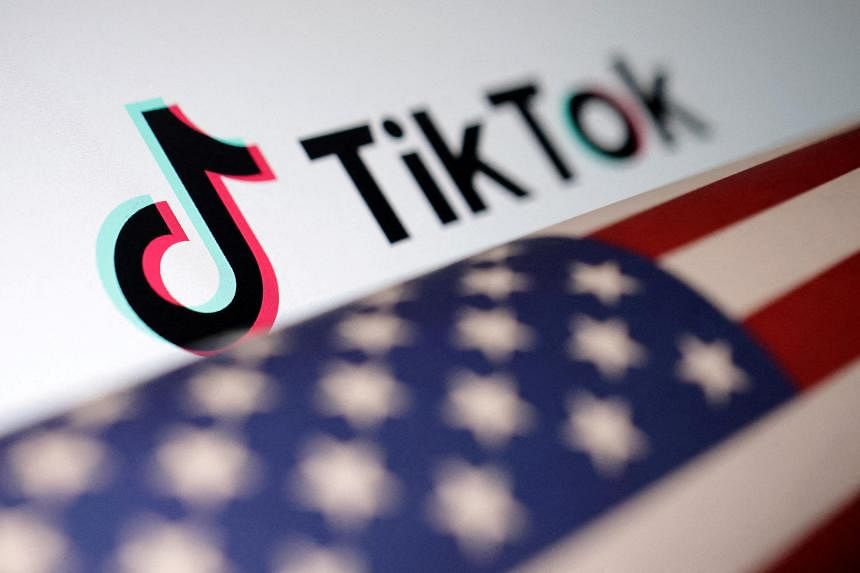NEW YORK - In a television commercial, Sister Monica Clare, a nun in northern New Jersey, walks through a church that is bathed in sunlight and sits in a pew, crossing herself. Her message: TikTok is a force for good.
“Because of TikTok, I’ve created a community where people can feel safe asking questions about spirituality,” she says in the advertisement.
Sister Clare is one of several fans of TikTok – along with drawling ranchers, a navy veteran known as Patriotic Kenny, and entrepreneurs – whom the firm is highlighting in commercials as it faces intense scrutiny in Washington.
“TikTok definitely has a branding issue in the United States,” Sister Clare, 58, said in an interview.
“Most people you talk to, especially people above the age of 60, will say that TikTok is just a bunch of superficial garbage. They don’t use it. They don’t understand what the content is.
“It’s very smart of TikTok to say, ‘No, that’s not what we are – we’re a lot more than that.’”
That seems to be the idea driving TikTok’s multimillion-dollar marketing blitz on TV and rival social media platforms nationwide – tagged #KeepTikTok – as the Senate considers a Bill that would force the company’s Chinese owner, ByteDance, to sell the app or have it face a national ban. Many lawmakers from both parties have said the app could endanger American users’ private data or be used as a Chinese propaganda tool.
Since the House voted in favour of the Bill on March 13, the company has spent at least US$3.1 million (S$4.2 million) on advertising time for commercials that are scheduled to run in April, according to data from AdImpact, a media tracking company.
Some of the places it is most heavily targeting are the presidential election battleground states of Pennsylvania, Nevada and Ohio, according to the data. TikTok has also spent more than US$100,000 on Facebook and Instagram ads recently, according to Meta’s Ad Library.
TikTok said it was spending more than AdImpact’s data showed, but the company did not provide specifics. Asked about its advertising efforts, Mr Michael Hughes, a spokesman for TikTok, said: “We think the public at large should know that the government is attempting to trample the free speech rights of 170 million Americans and devastate seven million small businesses nationwide.”
The advertisements are part of a broad lobbying campaign by TikTok to reshape the perception of the company among lawmakers and the public. It has vocally opposed the Bill, which it has framed as an outright ban, saying it has not and would not share data with Beijing or allow any government to influence its algorithmic recommendations of videos for users to watch.
ByteDance spent US$8.7 million on lobbying in 2023, according to OpenSecrets, a non-profit research group, and its in-house team and a variety of outside firms are trying to influence lawmakers. It has rallied its vast base of users to contact their representatives, although some of those efforts may have backfired. And TikTok’s chief executive Chew Shou Zi is a co-chair for this spring’s Met Gala, where TikTok will be the lead sponsor.
TikTok started amplifying the stories of everyday Americans such as Sister Clare and Patriotic Kenny in 2023 through a campaign it calls TikTok Sparks Good. Much of that effort appeared to be aimed at conservative audiences.
It spent an estimated US$19 million on TV ads that appeared largely on news programmes, especially Fox News, according to data from iSpot.tv, a TV measurement company. TikTok aired more than a dozen ads during Republican presidential debates or debate-related programming in 2023, the firm said. It is still running ads that promote creators from 2023’s campaign.
“It’s such a classic tactic,” said Professor Cait Lamberton, a marketing professor at the University of Pennsylvania’s Wharton School. “They’re taking an idea, putting it in the mouth of a human and allowing you to make a connection with that human.”
She added: “TikTok is framing itself as a brand that stands for freedom and democratisation of communication and frankly a lot of values that most people feel quite comfortable with.”
The American Civil Liberties Union, which has viewed the legislation as a threat to First Amendment rights, in March ran Facebook and Instagram ads that linked to a letter of opposition for people to send to their senators. A spokesperson for the organisation said it did not have a formal partnership or fund-raising relationship with TikTok or ByteDance.
Proponents of the Bill are also running ads. Newly formed non-profit groups led by conservatives, whose backers are unclear, have been airing TV commercials and placing ads on social media.
One of those groups, the American Parents Coalition, is led by Ms Alleigh Marre, founder of a public relations firm and a spokeswoman for the Department of Health and Human Services in the Trump administration. She promised “a seven-figure awareness campaign” called TikTok Is Poison in a March 20 news release.
The intensity of the battle has hit home for Sister Clare. She was delighted when her commercial began airing, she said, but was soon surprised to receive hate mail and even a few angry phone calls.
“It was this rush of ‘oh, so exciting’ and then ‘oh, what a bummer’,” she said.
“It was really from people who were committed to the idea that China is spying on us through TikTok, from people who probably never used social media in their lives.”
She said she was hopeful that TikTok’s marketing efforts, including the ad, would help send a different message about the app. (The company made a US$500 donation to her convent in Mendham, New Jersey, for her participation, she said.) “There’s a huge community of people doing good on TikTok,” she said. NYTIMES

